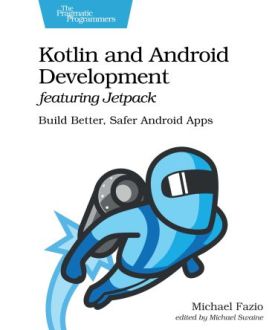Realm of Racket Learn to Program, Game One at a Time! 191
- Master the quirks of Racket's syntax and semantics
- Learn to write concise and elegant functional programs
- Create a graphical user interface using the 2htdp/image library
- Create a server to handle true multiplayer games
Chapter 1 : (Getting Started)
1.1 Readying Racket
1.2 Interacting with Racket
Raise—Chapter Checkpoint
Chapter 2 : (A First Racket Program)
2.1 The Guess My Number Game
2.2 Defining Variables
2.3 Basic Racket Etiquette
2.4 Defining Functions in Racket
Resume—Chapter Checkpoint
Chapter 3 : (Basics of Racket)
3.1 Syntax and Semantics
3.2 The Building Blocks of Racket Syntax
3.3 The Building Blocks of Racket Semantics
3.4 Lists in Racket
3.5 Structures in Racket
Interrupt—Chapter Checkpoint
Chapter 4 : (Conditions and Decisions)
4.1 How to Ask
4.2 The Conditionals: IF and Beyond
4.3 Cool Tricks with Conditionals
4.4 Equality Predicates, Once More
4.5 Comparing and Testing
Call-with-current-continuation—Chapter Checkpoint
Chapter 4? : (define define 'define)
4?.1 Module-Level Definitions
4?.2 Local Definitions
Abort—Chapter Checkpoint
Chapter 5 : (big bang)
5.1 Graphical User Interface
5.2 Landing a UFO
5.3 Using big bang: Syntax and Semantics
5.4 Guessing Gooey
Exit—Chapter Checkpoint
Chapter Challenges
Chapter 6 : (Recursion Is Easy)
6.1 Robot Snake
6.2 A Data Representation for the Snake Game
6.3 The Main Function
6.4 Clock Ticks
6.5 Key-Events
6.6 Rendering
6.7 End Game
6.8 Auxiliary Functions
Return—Chapter Checkpoint
Chapter Challenges
Chapter 7 : (Land of Lambda)
7.1 Functions as Values
7.2 Lambda
7.3 Higher-Order Fun
7.4 Two More Higher-Order Functions
7.5 Derive This!
7.6 apply
Break—Chapter Checkpoint
Chapter 8 : (Mutant Structs)
8.1 chad's First Battle
8.2 Orc Battle
8.3 Setting Up the World, a First Step
8.4 Action: How Structs Really Work
8.5 More Actions, Setting Up the World for Good
8.6 Ready, Set, big bang
8.7 Initializing the Bad World
8.8 Rendering the Bad World
8.9 The End of the World
8.10 Actions, A Final Look
Throw—Chapter Checkpoint
Chapter Challenges
Chapter 9 : (The Values of Loops)
9.1 Loops FOR
9.2 Multiple Values
9.3 Back to FOR/FOLD
9.4 More on Loops
Waitpid—Chapter Checkpoint
Chapter 10 : (Dice of Doom)
10.1 The Game Tree
10.2 Dice of Doom, The Game
10.3 Designing Dice of Doom: Take One
10.4 How Game Trees Work
10.5 Game States and Game Trees for Dice of Doom
10.6 Roll the Dice
10.7 Rendering the Dice World
10.8 Input Handling
10.9 Creating a Game Tree
10.10 The End Game
Kill—Chapter Checkpoint
Chapter Challenges
Chapter 11 : (Power to the Lazy)
11.1 Doomsday
11.2 Lazy Evaluation
11.3 Memoized Computations
11.4 Racket Can Be Lazy
Delay—Chapter Checkpoint
Chapter 12 : (Artificial Intelligence)
12.1 An Intelligent Life-form
12.2 Lazy Games
12.3 Adding Artificial Intelligence
Stop-when—Chapter Checkpoint
Chapter Challenges
Chapter 13 : (The World Is Not Enough)
13.1 What Is a Distributed Game?
13.2 The Data
13.3 The Network Postal Service
13.4 Organizing Your Universe
13.5 Distributed Guess
Error—Chapter Checkpoint
Chapter Challenges
Chapter 14 : (Hungry Henry)
14.1 King Henry the Hungry
14.2 Hungry Henry, the Game
14.3 Two United States
14.4 Henry's Universe
14.5 State of the Union
14.6 Main, Take Client
14.7 Main, Take Server
14.8 See Henry Run
On-disconnect—Chapter Checkpoint
Chapter Challenges
Conclusion. Good-Bye (Close Paren)
).1 Run Racket Run
).2 Racket Is a Programming Language
).3 Racket Is a Metaprogramming Language
).4 Racket Is a Programming-Language Programming Language
So Long
- АвторMatthias Felleisen, Conrad Barski M.D., David Van Horn, Eight Students of Northeastern University
- КатегоріяПрограмування
- МоваАнглійська
- Рік2013
- Сторінок312
- Формат170х240 мм
- ОбкладинкаМ'яка
- Тип паперуОфсетний
- ІлюстраціїЧорно-білі
- Термін поставки7-10 дней
- ЖанрМови програмування













допоможіть тим, хто ще не читав